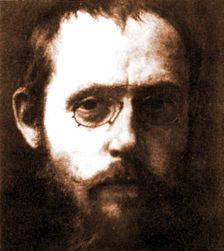 Born in Orleans in France, 1873, Charles Peguy was a notable poet and writer whose work was greatly influenced by his religious, nationalist and socialist ideals during his short life. Although a doubter in early life, he converted to Catholicism in his twenties and his writing from then on contained a strong religious dynamic.
Born in Orleans in France, 1873, Charles Peguy was a notable poet and writer whose work was greatly influenced by his religious, nationalist and socialist ideals during his short life. Although a doubter in early life, he converted to Catholicism in his twenties and his writing from then on contained a strong religious dynamic.
Born into a poor family, Peguy went to school on the outskirts of Paris and was successful as a student, winning a scholarship to attend the École normale supérieure that provided higher education for those who could not afford it. Under the influence of Lucien Herr, Peguy became a supporter of Alfred Dreyfus who had been wrongly convicted of passing secrets onto the Germans and imprisoned for a long period of time in one of the big political scandals of the time.
In 1896 Peguy married Charlotte Baudouin against the wishes of both their families and settled down to run a socialist bookshop where he also began to write. In his journal he published all his socialist thoughts, producing a series of polemics that covered a wide range of issues from criticizing the government to notions of world peace and translations of great works such as Shakespeare.
One of the great influences on him throughout his short life, was the story of Joan of Arc that seemed to guide his socialist spirit. He was also deeply interested in her religious and spiritual development and explored this in his work Le mystère de la charite de Jeanne d’Arc. It was typical of much of his work in that it seemed to polarize opinion. Some critics found him rather repetitive whilst others considered him a new and unique voice in literature at the time.

Peguy was often seen as the perfect antithesis of French writing at the time and many Americans who read translations of his work compared him to the likes of Walt Whitman. Peguy would have been horrified to know that the Italian dictator Mussolini later said that his work was a symbol of fascism, although he may have been more at ease when de Gaulle quoted his work in 1942.
Throughout his life Peguy was always an idealist but his work also explores areas such as love and relationships. When he fell for Blanche Raphael it caused him great pain as he chose to remain faithful to his wife. He expressed his emotions in the work Ballade de la peine which was not published until well after his death in 1941.
Around 1912, after his son fell ill, Peguy rediscovered his Catholic faith and alienated some of his socialist friends. His conversion also led to a more idealist world view. He wrote The Mystery of the Holy Innocents in the same year which promoted old style French spiritual and cultural values that he deemed to have been lost.

In some of his works, Peguy also foretold the coming of a European conflict and when war broke out he was one of the first to join up. A day before the Battle of Marne started, he was shot in the head and died in September of 1914. A memorial was raised to his memory and many wonder what contribution he would have made to French literature had he lived beyond his 37 years.

